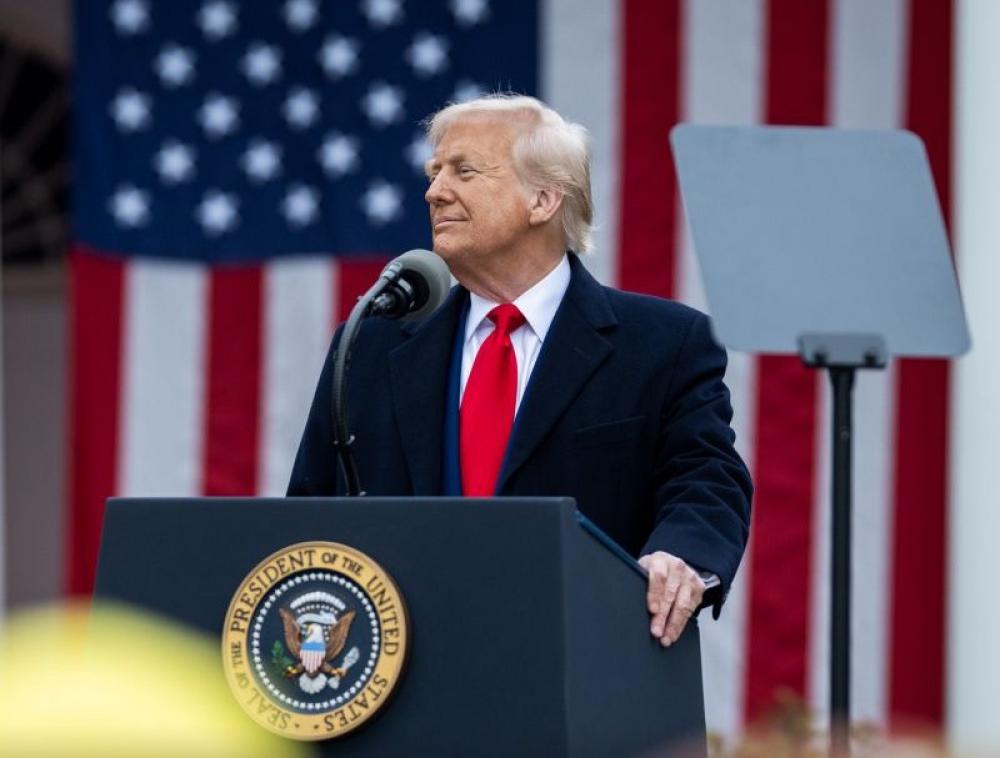Just Earth News | @justearthnews | 29 May 2025, 01:51 pm Print

Donald Trump had claimed credit for bokering ceasefire between India and Pak on May 10. Photo: The White House X handle
New Delhi/IBNS: India has firmly rejected, once again, the link between tariffs imposed by the United States and discussions with Washington, DC regarding the May 10 cessation of hostilities with Pakistan.
Responding to claims by the US government in a New York court that justified Trump's tariffs in keeping the peace, Delhi acknowledged talks with the US during Operation Sindoor, India's military response to the Pahalgam terror attack, but clarified that tariffs were never part of those conversations.
"From the time Operation Sindoor commenced on May 7 till the time of cessation on May 10, there was conversation between India and the US... (but) the issue of tariffs never came up in these discussions," External Affairs Ministry spokesperson Randhir Jaiswal said Thursday during his weekly press briefing.
The clarification follows a claim by US President Donald Trump in an American court that his contentious tariffs played a crucial role in persuading India and Pakistan to agree to a ceasefire following Operation Sindoor and four daysof military escalation afterwards.
Commerce Secretary Howard Lutnick and State Secretary Marco Rubio told the court that Trump has been threatening foreign nations, including key trading partners, with high import duties to "fix" global issues and cited the India-Pak ceasefire as well as that of forcing China to lower tariffs on American exports.
Lutnick and Rubio had argued that both India and Pakistan, possessing nuclear powers, could resume military conflict if Trump were to be ordered to roll back his tariffs.
They claimed Delhi and Islamabad had only agreed to the ceasefire after being 'tempted' by the promise of increased trade with Washington, D.C.
"An adverse ruling...could lead India and Pakistan to question the validity of President Trump's offer (and threaten) the lives of millions," Lutnick told the court.
The case relates to tariffs announced by Donald Trump on April 2, which proposed a 10% tax on most imports and even higher duties on goods from China and the European Union. Trump referred to the plan as “Liberation Day” and later paused some steeper tariffs while seeking trade deals.
The US government's argument was rejected by the court, and Trump's 'Liberation Day' tariffs were blocked.
A panel of three judges at the New York-based Court of International Trade ruled on Wednesday that, "The court does not pass upon the wisdom or likely effectiveness of the President's use of tariffs as leverage."
India rejects US role behind ceasefire
India has repeatedly denied claims by the US that Trump played a key role in facilitating the India-Pakistan ceasefire.
In fact, within a week of cessation of hostilities, Trump claimed credit at least five times, including once declaring he had 'disciplined' India and Pakistan by threatening to withhold trade.
India even put out a six-point statement, rejecting the US's claims of having brokered the ceasefire and Trump's offer of 'mediation' to find a solution to the Kashmir border issue.
Trump's claim that he might increase trade 'substantially' with India on condition of a ceasefire was also denied.
Jaiswal earlier too said there was "no discussion on trade with the US during Operation Sindoor".
Delhi and Islamabad spoke directly to negotiate the cessation of hostilities, he said.
Operation Sindoor was a fierce military operation launched by the Indian Air Force (IAF) on May 7 in response to the Pahalgam attack that killed 26 tourists who were enjoying their vacation at Baisaran Valley, which is referred to as India's Switzerland.
The operation aimed to dismantle terrorist bases in Pakistan and Pakistan-occupied Kashmir (PoK).
After the Pakistan Army again targeted Indian civilians and resorted to cross-border firing, the Indian Armed Forces retaliated, destroying defence systems of the hostile neighbour.
- Same price, smarter result: Anthropic drops major AI surprise
- Meta, NVIDIA announce long-term infrastructure partnership. Key details inside
- No one above the law: UN experts call for action over Epstein Files
- Teen with loaded shotgun races toward US Capitol — Arrested in dramatic standoff
- Power shift in Dhaka! Tarique Rahman takes oath as Bangladesh PM





-1763561110.jpg)
